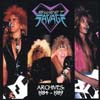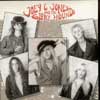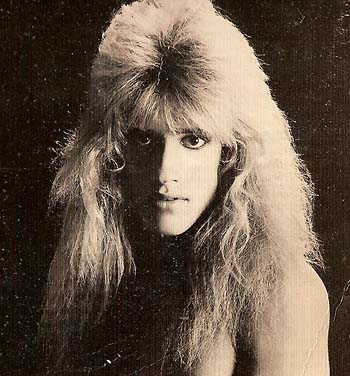
Sweet Savage / Kottack Guitarist
Chris Sheridan
|
FIB MUSIC: What's new? What's in the future?
Chris: Well, on the Sweet Savage front, I released the Sweet Savage Archives cd
a few years ago. The cd encapsulates the whole package and what happened. I haven't been playing for the longest time, but
for the past year and a half, I started playing with James Kottack (Kingdom Come) who has played with the Scorpions for about
twelve years now. He has this side project called Kottack. I joined just after their latest record came out, but
we have toured New York, Mexico, Japan.....had a really cool trip to Japan. Someone in Japan actually had a
Sweet Savage cd they wanted me to sign, which was really cool.
|
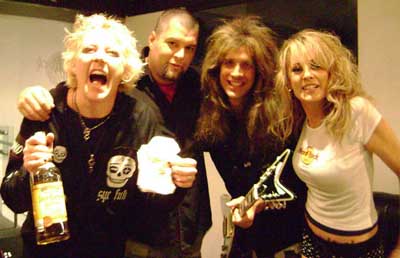
Kottack in Mexico City
|
|
|
FIB MUSIC: Isn't Tommy Lee's sister, Athena, in the band also?
Chris: Yes. I've known Athena since her days in Hardly Dangerous, we did shows
together. She ended up marrying James and they have kids now, so the band really has a family vibe. James has always been
a drummer and a really great drummer, but he has a lot of energy, so he needs to be out in front every now and then. He's a really
good writer. The band's vibe is sloppy, punky, like we don't care, but we really work hard at not caring (laughs). It's really
fun. I'm not sure what's in the future with that because it's his side project and if the Scorpions have
a big gig somewhere, he has to go, so it's a little hard to book gigs.
I have known James for twenty years as well. I knew him when he was in a band called Buster Brown. They used to
play the Texas curcuit that Sweet Savage and
Pantera played in 1985, '86, before everyone moved to L.A.. A lot of
history, never had played with him before. I went to go see him play a gig a little over a year ago. James pulled
me aside and said, "what are you doing now?" and I said "nothing" and he said, "do you want to play guitar in this band?" and
I said, "sure" and the next day I was in the band.
FIB MUSIC: Is Athena as good as Tommy on the drums?
Chris: Yeah. Well, she has her own style and I like it. I have always
been lucky to have played with really good drummers. It really makes all the difference when you play with
a drummer that you really vibe to, you know? Especially for the songs that we are doing, she has some
really cool stuff. It's also fun to play with her......Tommy Lee is a hard act to follow.
FIB MUSIC: Can you tell us a little about the Sweet Savage cd you released.
Chris: Sweet Savage broke up in 1989. It was a bitter, harsh break up, as most
of them are. It was very difficult. Sweet Savage wasn't just the band I was in, it was my dream band. I had played
with those guys for ten years. It was always me, Laine, Joey and a couple of other guys. Then here it is ten years
later, our record is out, we're doing this and that, living in L.A., making our mark, getting deals thrown at us. We
were just waiting for the right one. It was ours for the taking and then there's the break up. So, what happened was
for years, I just couldn't deal with it. The whole 80's scene, the glam, hair rock, or whatever....we just called it
rock n roll back then. It all went south in '91 anyway, in a major way, it took a huge dive. It wasn't cool in
the 90's to go around and say, yeah, I was in a rocker band. It kept eating at me for years and I finally thought that
the people that liked the band, might want to hear the songs. They don't see it like that, they weren't personally
wounded. They just had a good time at the Sweet Savage show and that's all they remember and that's great. I had
totally forgotten that completely. All I remembered was how bad it had hurt me. So, I finally got my head out of
my ass.....
FIB MUSIC: But you guys actually got to live the rock star life. You may not have had the huge money, but most of
the guys I have interviewed who had major record deals, were on MTV and toured the world, didn't have any money anyhow.
Chris: Right. Nobody did. I mean, Black n Blue were bumming cigarettes from
us, you know? It's the grand equalizer. We were very much rock stars in every sense of the word, same girls, same
parties, same drugs. We were just missing the machinery. Warrant were probably one of the later bands to get
signed out of L.A. So, it was still happening, there's was a window of opportunity. Maybe we waited too long, or
something. Anyways, I just wanted to honor that time and the people that came out...it was really for everybody. Sweet
Savage really wasn't just us. We did our part, but it was the whole Texas scene and the L.A. strip. People were
just drawn to our band and liked what we were doing and grooved on our music. Everywhere we went, we were big
in Baltimore, Daytona Beach and Raleigh, North Carolina, Ohio.....Cincinnati, Columbus, Dallas, Houston, Phoenix and L.A. Wherever
we went we drew a crowd.
So, I went back to Dallas and ran into Jerry Dainton, our old guitar tech and he had a box and then I ran into
Randy (St. John) and he had a box, had some old pictures. I just scavaged for about a year, year and half. All the board tapes...
anything I could find. There wasn't a huge record of what we did. Back then there weren't video cameras like there
are now. We didn't record a lot either. We recorded our EP, but we really were a live band, that's what we did. It was a lot
more complicated back then to record. So, I just tried to put together all the best things about the band, in a nutshell. Song
selections were easy with the EP and another demo thing that we did.....the live stuff was a challenge because some of the
recordings, you could hear people ordering drinks. It was just someone in the audience holding up a cassette recorder. But the
performance was good. I couldn't put everything on there, but its been pretty well received.
FIB MUSIC: Who remastered the songs?
Chris: The same guy who engineered the Sweet Savage EP, Mikey Davis,
who worked with everybody who played loud rock guitar in the 80's, you know,
Armored Saint,
KEEL, he had his hand in everything. Anyways,
I got an out of the blue email from him one day, in 2000 or something, and he says he's putting this website together and at some point
in the email says that he's going to put Sweet Savage up.....and I said, "you know what, I'm putting this record together, what do
you have going on. He had a recording studio in his house. So, he remastered them. The same guy who
fifteen years earlier engineered our first record. He really brings life to it; he really did a good job.
FIB MUSIC: Aren't there some live tracks on the cd?
Chris:
that was the thing.
We had so much fun in that band. Joey (C. Jones) was a great front man......the live tracks on the cd and Joey's raps that he
would do on stage....I think half the time he did it just to crack us up.......We got to play the songs we wrote. We played the
songs we liked. We would pick like off the wall cover tunes, like "Draw the Line" by Aerosmith.
FIB MUSIC: I know you did some AC/DC. Joey's Bon Scott was perfect.
Chris: Yeah, we would do "Girls Got Rhythm", or something, but yeah, Joey could
do that since he was sixteen....I've known him since I was twelve. That was the real tragedy....it's not that the
band broke up, you know, I lost a good friendship. Friendship or not, during that time it was the coolest fucking
thing. No matter what happened, Joey had a gift for entertaining the audience.....if the snare head broke or something, he
could go fifteen minutes, just with the mic, just talking and you're listening to every word and you're completely
entertained. He is definitely gifted. Some people back out and get lazy on stage. Joey always made sure that
every minute on stage was entertaining.
|
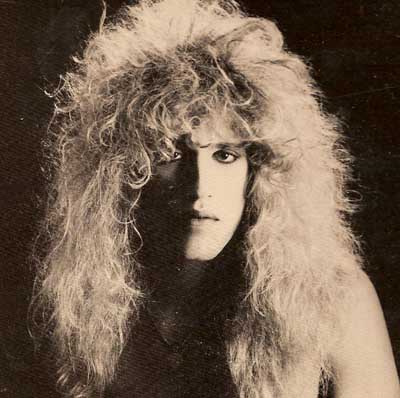 Laine Sheridan
Laine Sheridan
|
FIB MUSIC: Give me a little history on how Sweet Savage forms.
Chris: Of course, there's my brother, Laine (Sheridan) and we took piano lessons
as kids....we hated it, didn't practice...., of course, now I wish I had paid attention. We were kids though, we love
Aerosmith, AC/DC.....Laine wanted to play bass. He didn't play bass because he thought someone would be a
better guitar player, that's what he wanted to do. He would cut school to go practice. I was playing guitar, but I was
always younger, so my brother started playing with some other guys, more his age. Two years is a big difference in high
school, you know? Then Joey started singing with them and they used to play after football games at the school auditorium, wherever
they could play. But I would always be there hanging out. I didn't really have my own band, I would just kind of
tag along with these guys. We moved out of the small town we grew up in and moved to Columbus. Fast forward. Joey is in
a different band and we had always been part of the Dallas scene because my dad had lived there. So, my brother calls one day
and says, "come to Dallas, the scene is really great down here, can start the ultimate band". We talked about who we could
get to sing, "Give a Joey a call" and Laine says, "I played with Joey in high school", but Laine hadn't seen Joey play since
then, in the last year or so....he was playing on the other circuit.
|
Joey was always good, but by then he had become
brilliant. Like how a kid grows in high school....there's always that kid that was that shrimp in school and then
comes back the next year and has grown a foot. Joey had hit his stride and was incredibly good at it. So, we talked
to Joey. Sweet Savage was born in Dallas, Tx. We came up with the name at the Million Dollar Saloon, drinking and
looking at the girls. We wanted something that was bittersweet. We came up with Sweet Savage. It was Joey's idea to
do a color theme. We chose the colors black and white and pink and blue. By '84, the black and white and red, that
was pretty much covered by every band. We sort of went off the map and did the pink and blue thing.
FIB MUSIC: What was the Texas scene like back then?
Chris: The Texas scene was just insane, everywhere you went, Dallas, Fort Worth, Austin,
Houston, El Paso....there were a thousand seat clubs that would pack up on the weekends. You could put 800 people in a big club then, three
nights a week.....and get paid. We just did this circuit and it was just great. We went to L.A. to play a couple of times, we
went to Phoenix, back to Ohio, the East Coast....there was nowhere else for us to go and L.A. was happening. We ended up moving up
there in early 1987. It was the heyday. It wasn't like they were giving out record deals on the street corners, but it almost
was like that. Bands were getting signed left and right....bands that we knew. We knew Poison back in '85, before they got their
deal....when we were recording the EP.....a couple of them were crashing out at the same house we were staying at. Everything just
kept getting bigger, the EP went number one, we moved to the strip, we were one of the last bands to still get paid on
the strip. The Whiskey would still pay us 600 bucks for the night, when every other band was doing the pay to play. We really did
some things that nobody else did. I'm very proud of that.....until we hit the wall, we were still winning the race.
FIB MUSIC: How long does it take for Sweet Savage starts packing clubs?
Chris: There was a lot of buzz about the band, even before we played our first
gig at Matley's in Dallas. All the bands played there.....there was
Pantera, this band called Black Star....technically it would
only hold 300 people, but you could get 500 in there. It was insane, just a cramped little dive, that was this great rock
club. We booked our first show there, but we had already been sitting in with some bands there and people knew....we were
always out hanging in the scene....we were hanging out with the Pantera guys already. They were playing the same circuit. The owner
of Matley's says, "do you want to play" and we say, "we're ready" and he says, "how about this weekend?".....it was like a Wednesday, or
Thursday, or something. But there was a band already playing. At that time, you would play all weekend, or all week. You could make
a living playing.....so we come in and play and we break attendance records for the club, our first show. From there, we always
had tons of Marshall heads and cabinets. We put the money back in and made sure we had the biggest light show, the production, making
it look bigger and wilder than ever. That's kind of what we were known for, that big arena rock in clubs. Same with
Pantera. I saw
them years later when they were mega and I didn't see anything different....I didn't think they got any better, they were that
good in 1984. They were already dialed in and so were we. Sweet Savage was a Texas band. Even though we weren't all born there, but the
band itself was literally born there, right there on Greenville and Park Lane.
FIB MUSIC: Sure, right there where the Basement used to be.
Chris: Yeah. Well, the Basement came years later.
FIB MUSIC: So, the first Sweet Savage show breaks Matley's attendance records.
Chris: Yeah and we never looked back. Within a year, we had done the
EP, been to L.A. two times and by year two, our EP had gone number one in Europe.
FIB MUSIC: How long do you guys play on that circuit?
Chris: Well, even when we moved to L.A., we still played the circuit. In L.A., you
can't play all the time. Another thing that other bands didn't have is a truck, we had a truck, again, we put our money
back into the band. We could play some shows in L.A. and then leave for three or four weeks. We just kept getting bigger
in Dallas and even bigger in Houston. We would play this place in Houston called the Rock Zone...I don't know how many
people it would hold, but it was like a big House of Blues, it was giant, incredible huge and we would
pack it. So, even after we went to L.A. we still played the circuit.....and played the big gigs too, like New Years. But every
six to eight weeks we could make some money, we could drive to Texas, hit Phoenix and El Paso on the way, make some
money, maybe go up to Columbus, then go back to L.A. with some change in our pocket and the best part was the band was
tight as shit. It's one thing to rehearse a couple of times a week before your next show in L.A., but we'd have
twenty shows under our belt, when we'd come back. We were ready to go. That's what set us apart. Even before we ever
moved to L.A., we were seasoned players, we had been playing solid for two years.
FIB MUSIC: You guys leave for L.A. about two years after your first gig?
Chris: Yeah, we went to L.A. twice in '85, but it wasn't until '87 that we
took a one-way trip with the truck.
|
|
FIB MUSIC: Sweet Savage forms in '84?
Chris: Yes. It all came together pretty quick. It was that New Years between
'83 and '84, that's when we knew we had the line-up.
FIB MUSIC: How do you find drummer Randy St. John?
Chris: Ummmm. I think through some chicks, at that bar Matley's. There were these
girls that knew everything about the scene, total networking, that's what's different from the 80's. The girls
were involved. They helped bands network. Randy was suggested.....we knew what we were after....you know, we wanted like
four David Lee Roths (laughs). We wanted everyone to be their own showman, their own cartoon character, almost like
KISS, everyone with a really distinct personality, but everyone of us is a frontman. Not just one or two cool guys to watch
in the band, but all four....that's what we were after. And here's Randy, who is like 6'4 and totally ripped with muscle after
muscle, huge drum set and the biggest drum cage you've ever seen, some custom cage.....he hits really, really hard and he's really, really
good and it just clicked. We knew right away that he was our guy. We got together with Randy and that was it. We tried it with
another guitar player for awhile, but it soon became apparent that we were destined to be a four piece.
|
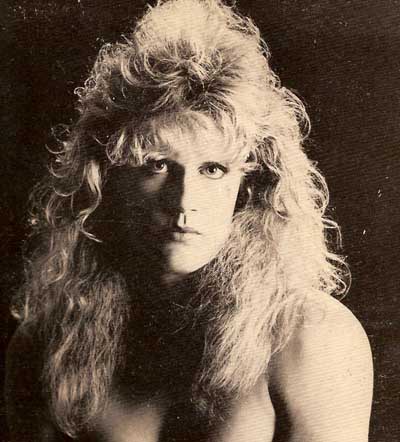
Randy St. John
|
|
FIB MUSIC: You remember Bobby Rock, right?
Chris: Oh yeah....another Texas guy with just muscle after muscle. He was from Houston. I think
we hooked him up with the Vinnie Vincent audition, or something.
FIB MUSIC: Yeah, he said he got the info from Joey.
Chris: Well good, I'm glad he did, because we didn't want Randy to quit on us (laughs). No, I don't think
he would have.
FIB MUSIC: When I interviewed him, I had asked him if he remembered Pantera and Sweet Savage back
then and he definitely did and he said the best looking girls were always at the Sweet Savage shows.
Chris: Right. Glad to be known for something (laughs).
FIB MUSIC: Any Bobby Rock stories come to mind?
Chris: I think he sat in with us in Houston. I knew he was an awesome drummer....I remember
he had a black Vette (laughs). Last I saw him was on cable access. He's vegetarian and he juices. He's still got all the
muscles....one of the nice guys in rock n roll. Not that there aren't that many nice guys in rock, but there are
a lot of pricks.....I was probably one of them for awhile. Very cool guy and one of the great drummers. You got his number? I'll
call him and see what he's up to (laughs).
FIB MUSIC: Any other Texas musicians come to mind?
Chris: We stayed with these girls in Houston, at their apartments, when we
were down there to play a show. There was this guy named Jerry Cantrell. He stayed in the same complex. We knew he was a really good guitar player and he
saw a few shows. Then he moved to Seattle and I remember thinking, what's he thinking, everything is in Los Angeles. Why would
he move to Seattle? In L.A., of course,
Black n Blue, Warrant, Poison, we were all hanging around doing the same thing. Playing
the same clubs, before any of them got a record deal. I saw your interview with
Lorraine Lewis from Femme Fatale. They got
their record deal, playing with us at the Whiskey. They opened up for us. It was our showcase. We had invited a bunch of
record people out to the Whiskey. One of the people that we invited, got there early apparently, saw
Femme Fatale and signed
them that night. That's when the whole thing snowballed for them. That's how it was back then; it was crazy. They were handing
out record deals like they were handing out speeding tickets.
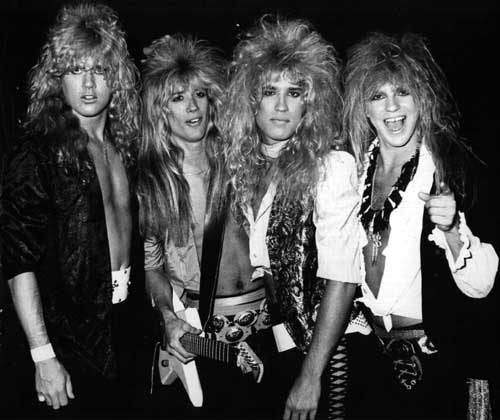 Sweet Savage
L-R: Randy St. John, Chris Sheridan, Laine Sheridan, Joey C. Jones
Sweet Savage
L-R: Randy St. John, Chris Sheridan, Laine Sheridan, Joey C. Jones
Backstage @ the Whiskey 1987
Of course, with
Pantera, I saw
Darrell play when I was about eighteen or ninteen and he must of been about sixteen or
seventeen. It was '83 or '84, somewhere around there. Rainy night, somewhere on Northwest Highway. It was
right when we were trying to figure out the band, before we had hooked it all up. We knew that this
was one of the biggest bands in town and I remember seeing them and just thinking that the guitar player
was just insane. He could play anything really well and he could rock out while doing it. We knew how high
the bar was before we even started, which is a good thing. Otherwise, we might have gotten lazy. There were
a lot of great bands around Dallas at that time. Great musicians like Lightning, of course, the Savvy (Ricky Lynn Gregg) band from
Fort Worth and
Pantera. They were pretty much the best cover rock band and originals around town, I could never hold a candle to
his playing....the band was great and they remained friends. People always talk about cross-town rivalries, they were
more Arlington, we were more like North Dallas. Even though we played the same places. People would think we had this
rivalry with them, but none of us thought much of it. We both liked playing rock music....there was no competition going on. People
just made things up. Then a couple of years later, they go with Phil and got a little heavier. They were one
of the first bands, that I ever saw, cover a Metallica song. They could have played anything; they were that good.
Like I said earlier, we all played the same circuit, so occassionally we would be playing when they had a night off and they would
come out and see us when we were playing at Savvy's. Whenever they did, we would have Rex & Darrell sit in, but we never let them sit in at the same time. So Laine
would go out front and Rex would come up with me, Joey & Randy. That way Laine would get to see 3/4 of Sweet Savage and then he
would go back on stage and I would jump down and Darrell would play my guitar. Then I got to see, from the audience, and I would
get to see the band. That way, we got 2 instead of 1 sit in and Laine & I could take a break. It was great.....we had a great
camaraderie. They were a great band from the get go.
FIB MUSIC: When you guys make the move to L.A., do you have a place to stay?
Chris: (laughs) No. We didn't have shit. It was the scariest fucking thing ever. In the hood,
in the worst part, nobody spoke english. There was this storefront.....I don't know what it was, a warehouse.....it could have
been condemned and there were people living there. There was this band from Fort Worth, called the Dallas Dolls and they were
staying there and we had played with them at Savvy's before, so we kind of knew them. Anyways, this place was called the
Martel Hotel.....Poison stayed there, we stayed there. The guy who was running the Martel Hotel started another place called
the Galaxy, so we moved in there and it was just trashed....so we all scrambled.....one of us got a girl here, one got a
girl there and I ended up moving in with
Rik Fox from
Steeler, but at the time, he was in a band called SIN.
Dana Strum produced their demo. That's how I met
Rik Fox, it was through
Dana Strum. They were a good band, had a couple of good guitar players. I actually borrowed one of their rigs to lay down
some tracks. It was a Randall, so that's what's on the EP. L.A. is the kind of place if you put it out there, you'll get what you
need. It's a harsh environment, but it can also carry you through. We were so determined....this is where we needed to be. We
couldn't play the bar circuit one more time. Like a goldfish, we had to have a bigger bowl and L.A. was the launching pad
to the rest of the world. We knew we had to be there, we wanted to be there and we had the songs, the band, the crew, everything
was together. Our first few gigs were great....we played Gazarri's, the Whiskey, Roxy, Troubadour.....I don't even know how we got the
gigs, but we did and then we just did the same thing we had been doing in Dallas. Within the first six to eight months, that's when
Joey quit the band. He left and started his own thing. Then Laine and I started rehearsing with this other guy named
Walt Woodward from Shark Island. He had been in this band called Americade who had done quite well in like '80 or '81. They sold
a lot of records independently. Walt was a cool guy. So, we spend the whole summer rehearsing. We almost got the new
line-up with Randy O from Odin. We got together and rehearsed a few times....it would have been different, we probably would have
changed the name. He was a little more trippy,
Jim Morrison-y, but it worked. We were ready for a new thing. The singer is 90% of your sound anyhow, you know? You have
to write around the singer. We were doing some weird stuff. It was still rock, but it was just more trippy. We wrote a couple
of songs and one called "Little Gypsy". We recorded it at rehearsal one night and we all thought it was great. Then we never
hear from Randy O again.....he just disappears, never shows up, weeks go by and we don't know what the fuck happened. Then we were
at the Cathouse one night and the guitar player from Odin, Jeff Duncan, comes up and says, "Dude, I love that Gypsy song, we just
recorded it". I was like, "What?" and he starts humming the melody and I said, "what do you mean you recorded it". What happened was
Randy O had taken these rehearsal tapes that we had done and went back to Odin and offered up two new songs. But to Randy's
credit, he gave me my publishing, so I ended up making a few hundred bucks off of that one. He took the songs, but he gave me
credit.
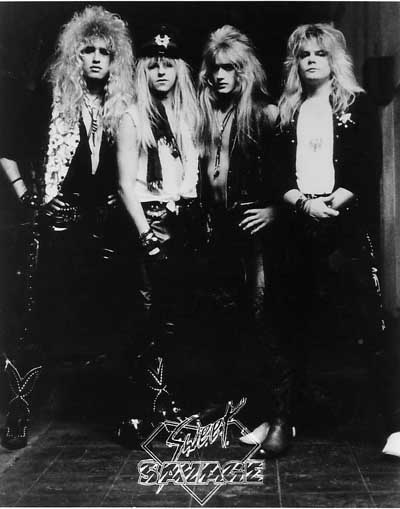 Sweet Savage
Sweet Savage
w/ Walt Woodward III (far right) |
FIB MUSIC: What does Joey do after he leaves?
Chris: Joey starts this band called Pal Joey. It was like his solo
project. He was with some management firm, this company called Alibi Artists. They were doing all the big shows. They
were doing the Guns n Roses shows. Like the last four or five months of gigging before Appetite for Destruction came out. They also
did the security for Cathouse...Rikki Rachman was one of the managers for Alibi Artists, they were not only booking shows, but they
were also doing band management and thats how we met Rikki Rachman. He ended up quitting. So, the guy left over convinced Joey that
the rest of the band was dead weight, he's the real star, he shouldn't carry us around anymore. Joey buys the line and leaves the band. But in
Joey's defense, whatever Joey does is going to be great, because he's great.
About six months later we reconcile and Joey rejoins Sweet Savage. We kept Walt as a drummer and that was a good line-up too. We ended
up doing a lot more
Zeppelin stuff and kind of expanded that way. Joey had gotten even better during that time period.
FIB MUSIC: Joey leaves for the first time in '87?
Chris: Yeah. '87 and we were back together by New Years '87 going into '88.
|
|
FIB MUSIC: What about Randy?
Chris: Randy left with Joey, but didn't come back with Joey. I think he ended up moving
to Texas shortly after that.
FIB MUSIC: Why did Randy leave?
Chris: I don't know. It was a break up, a real split. Laine and I were kind of
blindsided by it. It's like a relationship when someone is cheating on you and they're building this relationship behind
your back. You don't know anything about it and you don't see it coming. It's just one day, "by the way, I'm out", "what?". It
all happened really quick. When he came back again, we did a demo at Tito Jackson's studio. The sessions were paid by a record
label that wanted us. We recorded some demos, worked with another songwriter.....things were looking up.......we kept playing.....Poison
got their record deal, Warrant was about to get their record deal.....We were the next one rising to the top....we were right
there and Joey quits again......and I think I know why. I didn't know why for the longest time. There were reason that were given
that may have not necessarily been true. I've seen it a lot before where your master of your destiny, top of the minor leagues. Still
you start from the bottom when you get the record deal. You have to work with this producer, or this writer.....you lose some
of your identity. It happended to a lot of the bands in the 80's. You start to lose your control. Yes, it can bring you
better things, but it can come at a cost. You can become part of the machine and that can become overwhelming to some.
There was this band called Salty Dog. They were friends of ours.....they got a record deal, had a big deal, great record...they had
like a 4 album deal with Geffen. It was one of the last bands to get a big Geffen deal after Guns n Roses. Then the singer quits a
week after the album is released. If you have an aversion to success, sometimes you don't know it until you're in it. What did Joey do?
Joey went back to playing the clubs. For the most part, although he's been very close to success a number of times, that's kind of
where he stayed. I'm not saying there's anything wrong with it......I play clubs, you know (laughs)?.....and L.A. is not for
everybody. I think there was some of that going on. It's hard to sustain any quality of life....the meat grinder is in full swing here. That's why
they call it the boulevard of broken dreams......your friend makes it and you're still broke.
FIB MUSIC: But it just seemed like you guys were so close.
Chris: It's not like you sell your soul when you sign a record deal.....I guess I can't
actually say that........I never signed it. I have one that the record company signed, but we didn't. That's how close we
were. I have an unsigned record deal in a file. The record label signed it, with their lawyers and then it came to us and if we
had signed it, we would have had a record deal.....I still have it.
FIB MUSIC: ....and then you break up.
Chris: That's what L.A. can do to bands. So many bands move out here and then
break up. The record companies were looking for great bands, kick ass show, songs, hair, looks and everything else,
Poison, Warrant and even Sweet Savage had it....we had all that stuff, but
the record companies also look to see if the band could cut it....come to L.A. and six months later you break up....that doesn't
look good. They don't want to sign a band that is that volatile. Life is hard, the road is hard...if you can come here, stick
together for two years, build your draw, chances are you'll survive a couple of albums, a couple of tours and make some money for
the label. When the record companies continue to see the band break up, of course they're not going to invest in
you. Why would they? We were able to build the momentum back after the first break up, but then we break up again. It just
wasn't meant to be. Maybe there will be a Sweet Savage resurrection.
In retrospect, it's kind of a good thing. Sweet Savage never got old. Like Morrison, or Joplin, or Hendrix, James Dean, or
Marilyn Monroe. They never got old; they died in their prime. Sweet Savage died in its prime, at the top. It was impossible
to get any bigger independently, we did everything right. We're not a bunch of old guys trying to get the band back together. We didn't
hang around too long. The scene died with grunge. So, we never became a parody of ourselves. Our draw never dropped off. It's
not like people stopped coming to see us. We never had to play smaller and smaller places. Every step was a step up until the whole
thing blew up. That's kind of unique, in a way. It has some kind of purity to it. We were an 80's band that died in the 80's.
|
|
-Comments-
(to post comments you must login or register)
|



 Laine Sheridan
Laine Sheridan



